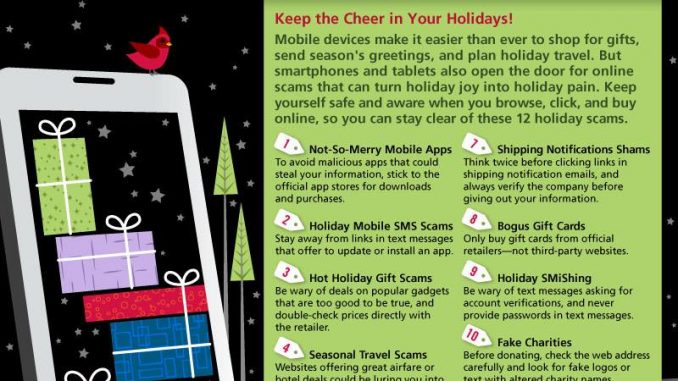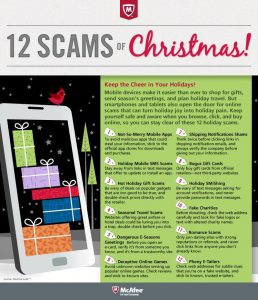
Don’t be a victim
1. Not-So-Merry Mobile Apps
Malicious software can masquerade as a trusted app to steal your personal information and charge purchases to your accounts. After stealing your username, password, and account information, malware can even hide in the background, watching your text messages for bank authorization codes to steal. That gives cybercriminals all they need to access your money and turn holiday cheer into holiday hassles.
2. Holiday Mobile SMS Scams
You could find yourself signed up for a premium rate texting service that racks up a hefty bill. Or even worse, you could end up with malware that lurks in the shadows on your device, stealing sensitive information, like passwords or bank account numbers. Keep an eye on your bill for unusual text messaging charges, and only update apps by using an official, trusted app store.
3. Hot Holiday Gift Scams
You know the adage “if it seems too good to be true, it probably is.” When it comes to incredible deals on the latest tablet devices, game consoles, and other hot new gadgets, that warning is especially true. If you click a link to enter a contest or get a great deal on a new device, you could end up on a site that tries to trick you into downloading malware or revealing personal information. Be suspicious of really low prices on popular holiday gift items, and avoid online stores you’ve never heard of.
4. Seasonal Travel Scams
For most of us, travel is a big part of the holiday season, and we all know the best travel deals are usually online. But before you book your next flight, rental car, or hotel room, remember that cybercriminals are working hard to trick you into giving up credit card numbers and other private info. Be wary of unrealistically low prices on vacations, and use only reputable travel sites.
5. Dangerous E-Seasons Greetings
E-cards are a fun and popular way to share the holiday spirit. Most electronic greetings are a safe, enjoyable part of the season, but some contain malware that makes itself at home on your tablet, phone, or computer when you click the link to see the greeting. It’s always better to be safe than sorry, so don’t open an e-card if you don’t know the sender. You can also check the address that the e-card came from to verify it belongs to a legitimate, known greeting company.
6. Deceptive Online Games
Since they’re always with us, smartphones and tablets make great platforms for online and interactive games that can be played anywhere at any time. But cybercriminals can use that same spirit of fun and competition to lure you into downloading malware. While you’re busy ridding the world of zombies, malicious software might be ridding you of your personal information or passwords. When downloading games to your mobile device, stick to safe, well-known app stores, and check online reviews for warnings from less fortunate gamers.
7. Shipping Notifications Shams
Cybercriminals know you’ll get deliveries during the holidays, so they send out fake but realistic email messages with shipping verification requests. But instead of bringing you cheer, these verifications only bring the hassles that come with recovering from account theft or identity fraud. Be extra careful before you enter personal or financial details into a form associated with a shipping notice. Check the email address of the sender and look for spelling or grammar mistakes that could be a warning sign that the email is fake. And keep in mind that most shippers will already have all the info they need to deliver a package from your friends or relatives.
8. Bogus Gift Cards
Sometimes gift cards are the perfect solution for those hard-to-shop-for friends and relatives on your list. Unfortunately, they could also be the perfect solution for cybercriminals, who are happy to sell bogus gift cards online. The safest way to buy gift cards from your tablet, smartphone, or computer is from the official retailer—not a third-party website. Otherwise, you could have some very disappointed and embarrassed friends trying to shop with fake gift cards at the mall!
9. Holiday SMiShing
You’re probably already familiar with email phishing scams. But with the increasing popularity of mobile phones and tablets, SMiShing—text messaging phishing—is becoming just as dangerous. Cybercriminals pretend to be banks or other organizations in urgent need of personal information to avoid an account lockdown or other dire consequences. But most legitimate businesses would never ask you to provide personal details, passwords, or other sensitive information in a text message. Instead of replying, contact the organization directly by phone if you have any concerns about your accounts.
10. Fake Charities
Most of us are moved to reach out to the less fortunate during the holidays by donating generously to charities. Unfortunately, cybercriminals who take advantage of holiday giving are also part of the season. Be on the lookout for fake charities using copied text and logos in email or on websites, and check the sender’s address in email messages. Some fake charities will use a name, email address, or web address that is nearly identical to a real charity, so be observant before you reach for your wallet.
11. Romance Scams
Everyone wants someone special to share the holiday season with. But don’t let the desire for companionship cloud your judgment when it comes to online dating. Cybercriminals use photos and email or text messages to pretend to be another member of a dating website, but their goal is to lure you into visiting a website laden with malware. Keep yourself safe by only joining dating sites with strong reputations or referrals. And never click on links from anyone you don’t already know and trust.
12. Phony E-Tailers
There’s no shortage of phony websites posing as legitimate retailers, hoping you’ll hand over your credit card number and personal information for a “once-in-a-lifetime” offer. Unfortunately, that special offer might turn into identity theft or an empty bank account. Check names and web addresses carefully for subtle differences that might indicate you’re on a fake website and, whenever possible, limit your online shopping to known, trusted e-tailers.
Keep Yourself Safe Throughout the Holiday Season
Follow these tips to help keep holiday scammers at bay.
Stick to reputable e-commerce sites and look for a Trustmark that indicates that the site has been verified as safe by a trusted third-party, like the McAfee SECURE™ Trustmark. Also, look for a lock symbol and “https” at the beginning of the URL to see if the site uses encryption to protect your data.
Be wary of any offer that sounds too good to be true, and always look for signs that an email or website may not be legitimate, such as low-resolution images, misspellings, poor grammar, or odd links.
Don’t click on any links in messages from people you don’t know, and if you come across a shortened URL, use a URL expander to see where the link is directed to before you click.
With these few, simple steps you can enjoy a safe holiday season.




